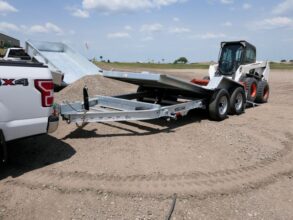Tips for Lowering the Cost of Commercial Propane Mowers
By Jeremy Wishart

Purchasing new commercial mowers is always a hefty investment for a professional landscaper. And for companies looking to invest in alternative fuels such as propane, rather than continue operating gasoline or diesel mowers, there’s likely an additional upfront cost associated with the equipment — sometimes as much as $1,000 per mower depending on the model.
Fortunately for contractors, the additional upfront cost of a propane machine can be reduced or recouped over the lifetime of the mower if the propane mower purchaser takes a few actions.
By combining fuel contracts, equipment incentives, OEM rebates and special pricing, using conversion kits for existing machines, and factoring in a propane mower’s higher lifetime productivity, contractors can purchase a clean-burning mower for the same as or less than a gasoline or diesel engine of a similar model.
Tip 1: Take advantage of alternative fuel contracts
A lot of landscape contractors are initially attracted to propane because of the low cost of the fuel. That cost can actually be further reduced for a contractor purchasing propane in bulk over an extended period of time using a fuel contract.
Through a fuel contract with a local propane retailer, contractors can negotiate a fixed price for their propane delivery and propane cylinder leases, and have that agreed-upon price locked in for a year or more. Building a contract for a set price is a budget-friendly practice to prevent headaches associated with fluctuating oil prices.
Companies, such as Rotolo Consultants Inc. in Louisiana, are saving up to 40 percent on the cost of fuel for their mowers in comparison to what they were spending on gasoline. A good partnership with their propane retailer helps the company keep fuel costs steady by settling on a fuel contract.
Another example, Davis Mowing Service, in Sauk City, Wis., reported saving as much as $2.70 per gallon of propane compared to gasoline when gasoline prices were high. Stay Green Inc., a company with 66 mowers in Santa Clarita, Calif., estimated that running its fleet on propane costs half of what it cost with gasoline.
Tip 2: Use equipment incentives
Certain states and organizations offer incentives or rebates for using alternative fuels.
The Propane Education & Research Council (PERC), for example, has helped fund equipment purchases and conversions of more than 3,500 machines since starting the Propane Mower Incentive Program in 2012. The program essentially removes the initial cost difference by offering either a $1,000 rebate on a new propane mower or $500 on a qualified conversion kit. It will likely be offered to contractors again starting in October.
Ringers Landscaping in Fox River Grove, Ill., got a new propane mower fleet — 10 Gravely commercial mowers — at 60 percent of the retail cost by applying for the program while PERC was offering double incentives. Owner Erik Ringstrand said Ringers also received a rebate from the state of Illinois that supplemented the purchase.
Davis Mowing Service also used the Propane Mower Incentive Program alongside an incentive through the state of Wisconsin to remove $1,500 from the upfront cost of three new Ferris mowers. And U.S. Lawns, a commercial landscape franchise in Hampton Roads, Va., received nearly $34,000 through PERC’s program and a state incentive program.
Other organizations, such as Clean Cities, local environmental groups, and locally based propane councils, may offer rebates or grants to businesses considering alternative fuel equipment.
Tip 3: OEM rebates and special pricing
A strong relationship with OEMs can also bring down costs associated with new equipment. Some OEMs offer rebates or special fleet pricing incentives if several machines are purchased at once.
Many OEMs currently offer propane equipment, including: Gravely, Exmark, Toro, Walker, Big Dog, Bob-Cat, Cub Cadet, Dixie Chopper, Ferris, Husqvarna, Hustler, John Deere, R&R Products, Kubota, Scag, Snapper Pro, Ventrac, and Zipper. It’s worth asking a dealer about propane when considering new equipment. There are, in fact, more than 150 models of propane mowers on the market today, including stand-on, zero-turn, and walk-behinds.
OEMs can also help companies save by offering training on mower maintenance and cylinder exchange to employees at a contractor’s home office, which saves time and money for business owners seeking training, and opens an opportunity for employees to learn and develop skills. This was one of the benefits RCI had in purchasing its mowers from John Deere. Between its propane retailer and John Deere representative, all employees at RCI were quickly educated in switching out propane tanks on the mowers. RCI’s maintenance shop became more efficient and detailed by focusing on the one brand of propane mower, rather than the mash-up of makes and models that previously made up the fleet.
Tip 4: Consider conversion kits
If a contractor doesn’t have a budget for new propane equipment, a less expensive way to convert an existing mower fleet to propane is with certified conversion kits.
Five companies offer certified conversion kits that meet the highest environmental standards from the Environmental Protection Agency and the California Air Resources Board. More information about Alliance Small Engines, EnviroGard, Hendrix Progressive Fuel Technologies, Metro Lawn and Propane Power Systems is available at propane.com/commercial-landscape/propane-conversions.
Russo Lawn & Landscape in Windsor Locks, Conn., has used PERC’s $500 rebates to convert its fleet to propane over several years. The company started with converting four mower engines in 2013 — two Exmark Vantage stand-ons and two Exmark Lazer Z zero-turns — along with buying two dedicated propane Exmark Lazer Z mowers.
Tip 5: Offset upfront costs with an increase in productivity
Improved productivity is an often-stated benefit when contractors switch to propane.
Propane creates less downtime for fuel-related maintenance and repairs, so equipment stays out in the field working (and making money for the landscaper).
Refueling occurs onsite, and fuel delivery can be tailored to the company’s specific needs. There’s no more crew time wasted refueling at gas stations in the morning and zero chance of fuel pilferage, something so common for contractors that they built a pilferage line item in their budgets.
All of these benefits lead to more productivity, which means more lawns are cut each day. That additional productivity can help a contractor make up the increased upfront equipment costs fast.
For more information on how propane can save money, visit propane.com/commercial-landscape/ to read full case studies, watch testimonial videos, learn about propane retailers and OEMs offering propane equipment, and even determine savings generated by switching to propane with PERC’s cost calculator.
Jeremy Wishart is deputy director of business development at the Propane Education & Research Council. He can be reached at jeremy.wishart@propane.com.


